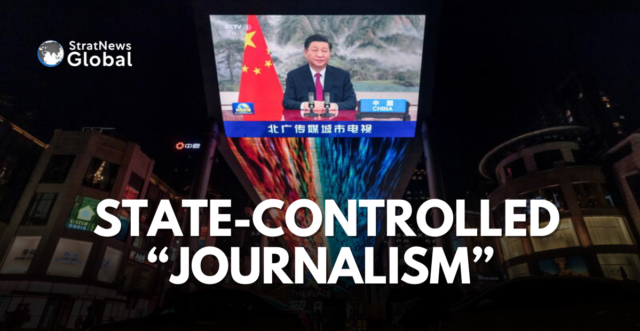When the Chinese government hands out awards for journalism, something doesn’t smell right. In fact, it’s the Central Publicity Department of the Chinese Communist Party which actually approves the awards and last week, the top honour went to a report titled “Xi Jinping Elected as President of China and Chairman of the Central Military Commission with Unanimous Votes.”
Clearly, these awards have little to do with journalism in a country where the media is largely state-controlled.
The National Radio and Television Administration (NRTA) is the arm of the Chinese government dedicated to shaping all media in the country, from radio to online streaming.
Under strict party guidance, the NRTA enforces policies that ensure every story aligns with government-approved narratives. It supervises licensing, censors content, and controls the themes in each broadcast, transforming the media into a machine for government messaging.
Be it print articles, radio or television broadcasts or even digital podcasts, there is no semblance of independent thought.
Everything must align with the thinking in the party and government policy. Needless to say, in such an environment, there’s no space for investigative journalism.
The awards reward the “Four Abilities” (control over communication, influence, loyalty, and credibility) and the “Four Consciousnesses” (obedience to the Party’s view of the world). The awards’ core mission is to strengthen loyalty to Xi Jinping’s leadership, project national unity, and silence any form of dissenting opinion in the media.
This year’s awards highlighted 373 pieces carefully selected to paint a perfect picture of party-led progress.
While promoting themes of loyalty and patriotism, the awards also used coverage of regional projects, such as Xinjiang’s development, to give the appearance of modernization. International critics, however, point out that such “progress” is often superficial, designed to cover up more pressing issues within China.
Stories focusing on young officials’ loyalty or regional “beautification” projects serve to distract from real challenges, presenting a picture of a utopian society that exists only in party-approved headlines.
Public Response: Satire And Scepticism On Social Media
The public is no fool. After the awards were announced, reactions flooded Chinese social media, with many users sarcastically commenting on the award for “Xi Jinping’s unanimous election.”
Some wrote, “The news industry is dead in China,” while others helpfully added that journalism had “died ten years ago.”
Research Associate at StratNewsGlobal, A keen observer of #China and Foreign Affairs. Writer, Weibo Trends, Analyst.
Twitter: @resham_sng





